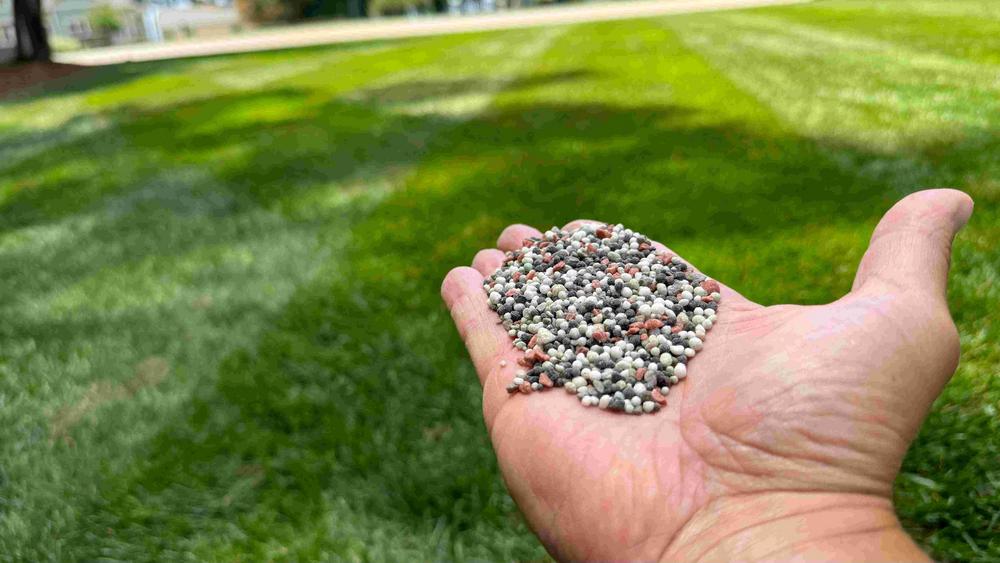Does lawn fertilizer go bad? If you're pondering the question, you've come to the right place. As lawn care experts, the short answer is yes, but it's a bit more nuanced than that. The longevity of your fertilizer depends on its type, storage conditions, and several other factors.
In this article, we'll answer this question by diving deep into how long fertilizers usually last, the different kinds of fertilizers and their shelf life, as well as factors that affect lawn fertilizer's shelf life.
So, if you're ready to discover how to make your lawn fertilizers last as long as possible, continue reading.
From understanding the shelf life of liquid vs granular lawn fertilizer to knowing the best storage methods, we'll cover everything you need to know.
What this article covers:
- How Long Does Lawn Fertilizer Last?
- How Do You Know if Fertilizer Has Gone Bad?
- What Are The Best Storage Methods for Lawn Fertilizers?
- Factors Influencing Fertilizer Longevity
How Long Does Lawn Fertilizer Last?
Wondering how long does lawn fertilizer last? Well, the longevity of lawn fertilizer largely depends on its type and storage conditions.
Our collection of lawn fertilizers at Lawn Synergy is perfect for you if you're looking for lawn care products that are not only effective and cater to your lawn's needs but are also long-lasting.
Let's take a look at different kinds of fertilizers and discover their shelf life:
Granular Fertilizer
Granular fertilizers are popular due to their ease of use and long shelf life. From our experience, these fertilizers can last several years if stored properly.
The key is to keep them dry and in a cool place. Moisture is the enemy here, causing clumping and reducing effectiveness.

If the fertilizer is dry and pours easily into your spreader hopper, the fertilizer is still in perfect condition and its effectiveness is the same. However, if the fertilizer is clumpy, soft, and moist, it’s best to discard and start with a new bag of fertilizer. It will not spread evenly, and most likely the slow-release capsules have been damaged resulting in nutrients being less effective.
Two of our favorite fertilizers are the Starter Fertilizer 15-20-10 Plus Iron and the Organic Lawn Fertilizer 5-3-0 BioBoost with 2% Iron.
The Starter Fertilizer is perfect for new lawns as it is a specialized blend aimed at supporting the growth of new lawns, overseeded lawns, and sod.
Meanwhile, the Organic Fertilizer provides your lawn with essential nutrients and increases the organic matter in the soil. It contains 2.25% Iron and has a no-burn formula.
Liquid Fertilizer
Liquid fertilizers offer quick absorption but have a shorter shelf life. Typically, they last about 8-10 years if unopened. Once opened, we recommend using them within a year for the best results.

Our findings show that exposure to air and contaminants can degrade liquid fertilizers faster. This rapid absorption makes liquid fertilizers ideal for quick fixes or when your lawn needs an immediate nutrient boost but it’s best for only spoon feeding as it can not carry the weight in nutrients your lawn needs
Compost
Compost, while technically a type of fertilizer, behaves differently. Based on our observations, compost doesn't go bad in the traditional sense, but it can lose its nutrient value over time.
Properly aged compost is beneficial, enriching the soil and supporting healthy plant growth. However, if it smells foul or has visible mold, it's best to refresh your pile.
Compost is a natural way to improve soil structure and nutrient content, making it a sustainable choice for lawn care.
How Do You Know if Fertilizer Has Gone Bad?
You might wonder, "Do I need to fertilize my lawn with fresh fertilizer?" Look for these signs to determine if your fertilizer has expired:
Clumping or Hard Lumps in Granular Fertilizers:
- Granular fertilizers should flow freely. If they have clumped together or formed hard lumps, this is a clear indication of moisture exposure. Once in a while you can find some clumping but if they break apart easily, it still can be utilized.
- Clumping reduces the effectiveness and even distribution of the fertilizer.
- Break apart a few granules to see if they crumble easily or remain stuck together.
- Wet, soft, and not free flowing indicates a sure sign the fertilizer is bad and should be discarded.
Foul Odor or Unusual Color in Liquid Fertilizers:
- Liquid fertilizers should have a consistent color and smell. If you notice a foul odor, it could indicate bacterial growth or contamination.
- An unusual color can also signify that the product has chemically degraded.
- Shake the container and check if the liquid has separated or formed sediments.
Mold or Off Smell in Compost:
- Compost should have an earthy smell and appear dark brown. If it smells putrid or has visible mold, it is likely decomposing improperly.
- Mold can indicate excessive moisture or lack of aeration in the compost pile.
- Turn the compost and ensure it is adequately aerated and balanced with the right mix of greens and browns.
If you notice any of these signs, it's time to get a new batch to ensure your lawn gets the best nutrients. Using expired fertilizer can result in poor lawn performance and wasted effort. It can also burn the lawn causing damage.

What Are the Best Storage Methods for Lawn Fertilizers?
Proper storage is crucial for maintaining fertilizer quality. Follow these tips to ensure your fertilizers remain effective:
Store in a Cool, Dry Place Away from Direct Sunlight:
- Temperature fluctuations can degrade fertilizers. A stable, cool environment extends their shelf life.
- Direct sunlight can cause containers to heat up and potentially break down the fertilizer components.
Keep Containers Sealed Tightly to Prevent Moisture and Air Exposure:
- Moisture is a primary enemy of both granular and liquid fertilizers. It can cause granules to clump and liquids to degrade.
- Use airtight containers to protect the contents from humidity and airborne contaminants.
Use the Original Packaging if Possible, as it's Designed to Protect the Product:
- Original packaging is specifically designed to maintain the integrity of the fertilizer.
- These packages are often made to resist moisture and light exposure, providing optimal storage conditions.
- If the original packaging is damaged, transfer the fertilizer to a similar airtight container.
Avoid Storing Fertilizers in Outdoor Sheds or Garages Subject to Extreme Temperatures:
- These areas can experience wide temperature swings and high humidity, detrimental to fertilizer quality.
- Choose a storage area with minimal temperature variation, such as a basement or climate-controlled storage room.
Label and Date Your Fertilizers:
- Clearly label containers with the type of fertilizer and the date of purchase.
- This helps in keeping track of the product's age and ensures older stock is used first.
These practices help extend the life of your fertilizers, ensuring they remain effective and ready for use when needed.

Factors Influencing Fertilizer Longevity
Several factors can impact how long your fertilizer remains effective. Moisture is a significant concern; high humidity can cause clumping in granular fertilizers, rendering them less effective.
Temperature also plays a crucial role. Extreme temperatures can degrade both granular and liquid fertilizers, reducing their potency and shelf life.
Exposure to air is another critical factor, as it can lead to contamination and reduced effectiveness, especially in liquid fertilizers. Proper storage is essential to maintain the quality and effectiveness of your fertilizers.
Additionally, if you're wondering is lawn fertilizer toxic or is it ok to fertilize lawn in hot weather, check out our articles on those two topics for more insight.
Understanding these factors will help you maximize the longevity and performance of your lawn care products.
Conclusion
So, does lawn fertilizer go bad? Yes, it does, but there's more to it. Proper storage and knowing your fertilizer type are key to extending its life.
Granular fertilizers, if kept dry and cool, can last several years. Liquid fertilizers should be used within a year of opening to ensure their potency. Compost, though it doesn't expire traditionally, can lose nutrient value over time.
From our experience at Lawn Synergy, maintaining your fertilizers correctly ensures your lawn stays lush and vibrant. Keep your lawn at its best with our expert tips and high-quality products.
Visit Lawn Synergy today for advice and solutions tailored to your lawn care needs.
If you want to learn more, why not check out these articles below:
- Can You Put Starter Fertilizer on Existing Grass
- Lawn Food vs Fertilizer
- Can You Fertilize Dormant Grass
- Does Grass Fertilizer Kill Weeds
- Best Weed and Feed for Bermuda Grass
- Best Fertilizer for Yellow Grass
- Best Fertilizer for Bahia Grass
- Best Fertilizer for Tall Fescue Grass
- Best Weed and Feed for St. Augustine Grass
- Best New Lawn Fertilizer
- Best Organic Fertilizer for Lawn
- Best Weed and Feed for Lawns
- Best Lawn Fertilizer for Texas
- Best Lawn Fertilizer for Florida
- Best Fertilizer for Clay Soil Lawn




